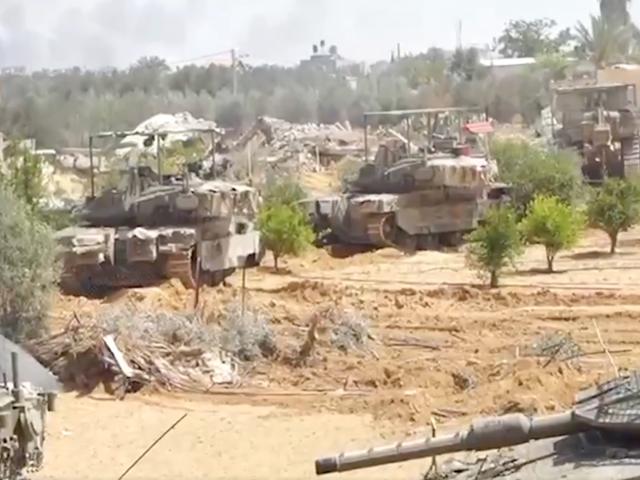In a dramatic turn of events, Israel has escalated its relentless offensive in Gaza's southern city of Rafah, intensifying its mission to eradicate Hamas militants. This comes just a day after Hamas rejected a comprehensive proposal that American sources claim met all their longstanding demands.
On Thursday, IDF helicopters unleashed a barrage of strikes on Gaza’s Rafah, with residents describing the scene as a war zone. The armed wing of Hamas, the Izzedine Al-Qassam Brigades, reported fierce street battles as Israeli forces pushed deeper into the city. Top US diplomat Antony Blinken emphasized that despite the ongoing conflict, a truce remained within reach.
Israel should make clear that if the ceasefire deal collapses, which will be entirely fault of Hamas, it will not wait a moment more before commencing full Rafah operation & putting Hamas leaders in Doha on notice there is target on their back. pic.twitter.com/OM3eRtgmro
— Arsen Ostrovsky 🎗️ (@Ostrov_A) June 13, 2024
Israeli ground forces have been entrenched in Rafah since early May, targeting Hamas fighters near the Egyptian border. This operation has sparked international outcry over the fate of displaced civilians crammed into the besieged city. Western Rafah has been pummeled by an array of Israeli military assets, including warplanes, Apache helicopters, quadcopters, artillery, and naval firepower, residents said.
Hamas's unprecedented assault on southern Israel on October 7 triggered the current conflict. The attack left close to 1,200 people dead, mostly civilians, and saw 251 hostages taken. Of these, 116 remain in Gaza, though the Israeli army reports that at least 41 hostages are dead.
In retaliation, Israel launched a massive military campaign in Gaza, resulting in the deaths of over 25,000 people, of which Israel claims over 15,000 are militants. Most urban warfare experts have applauded Israel's low civilian to combtatant death rate, estimated to be in the 1-1 or 1-1.5 range which, according to some like John Spencer, who is the foremost expert on urban warfare in the world and heads up the department at West Point, is a remarkable achievement.
Dr. Jordan Peterson sits down with urban warfare expert John Spencer about the Gaza War.
— ✡Israel and Stuff✡🎗️ (@IsraelandStufff) June 12, 2024
- Dr. Peterson's understanding of the war was spot on.pic.twitter.com/iSyoBvLrn9
- Spencer's conclusion on why student protests are so pervasive should make parents skeptical about the cost of…
A Complex Path to Peace
The International Court of Justice (ICJ) issued a binding ruling in May demanding Israel halt operations that could lead to the "physical destruction" of Palestinians. Israel firmly responded that it had not, and would not, engage in such operations. Demonstrating compliance with international demands, Israel supervised the evacuation of nearly a million Palestinians from Rafah before commencing its offensive.
Efforts to negotiate a truce have been fraught with difficulties. The situation became more complex when Israel initiated ground operations in Rafah, but US President Joe Biden launched a renewed effort in late May to broker a deal. On Monday, the UN Security Council adopted a US-drafted resolution supporting Biden’s peace plan.
Blinken, speaking in Doha, expressed optimism about working with regional partners to finalize the agreement. However, Hamas's response to mediation efforts has been mixed. While some of their proposed amendments are feasible, others remain contentious.
The IDF is obliged to coordinate with the Red Cross and informs in advance about activities that will take place tonight, in West Rafah and asks the Red Cross personnel not to come to the area so that they will not be harmed.
— GB (@GBinIsrael) June 12, 2024
A Red Cross agent shared the info with Hamas. pic.twitter.com/mRgyrj9tpv
Senior Hamas official Osama Hamdan reiterated the group's demand for a permanent ceasefire and a complete withdrawal of Israeli troops from Gaza—conditions Israel has consistently rejected. The proposed plan includes a six-week ceasefire, a hostage-prisoner exchange, and extensive reconstruction efforts in Gaza.
Despite Blinken’s assertion that Israel supports the plan, Prime Minister Benjamin Netanyahu has yet to formally endorse it. Netanyahu’s government, which includes far-right factions staunchly opposed to the deal, presents an additional hurdle.
IDF: IDF troops are continuing to operate against terrorist infrastructure and operatives in the Gaza Strip
— Israel War Room (@IsraelWarRoom) June 13, 2024
IDF troops are continuing intelligence-based, targeted operations in the area of Rafah. Over the past day, the troops conducted targeted raids in the area, located… pic.twitter.com/m8MzTYFsax
Blinken remains hopeful, stating, “We have to see... over the course of the coming days whether those gaps are bridgeable.”
As the international community watches closely, the outcome of these negotiations could determine the future of peace and stability in the region. For now, the conflict in Rafah rages on, with no clear end in sight.


